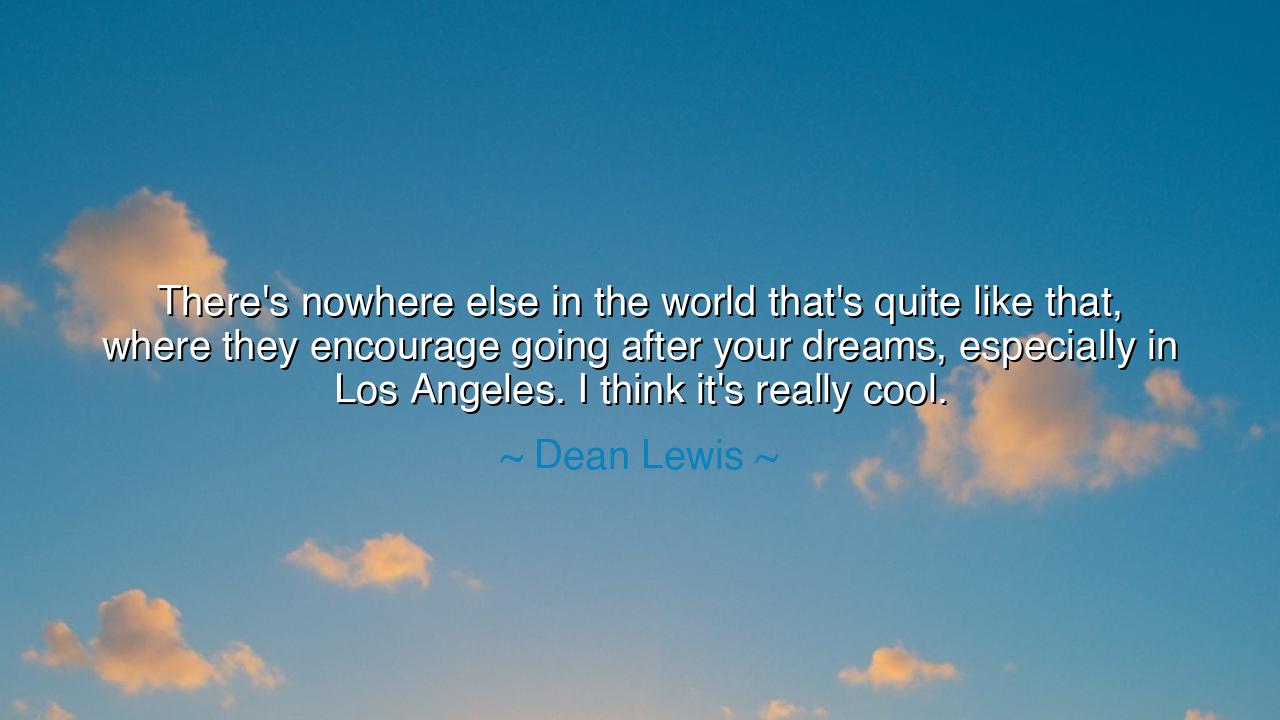
There's nowhere else in the world that's quite like that, where
There's nowhere else in the world that's quite like that, where they encourage going after your dreams, especially in Los Angeles. I think it's really cool.






“There's nowhere else in the world that's quite like that, where they encourage going after your dreams, especially in Los Angeles. I think it's really cool.”
— Dean Lewis
In these heartfelt words, Dean Lewis, the singer and poet of modern longing, speaks of the sacred flame of dreams—that divine spark that drives the human spirit to reach beyond itself. His praise of Los Angeles is not merely a compliment to a city, but an ode to a place where aspiration itself becomes a way of life. When he says, “They encourage going after your dreams,” he honors the rare culture of belief that fuels creation, where the impossible is not mocked but embraced. His words remind us that in some corners of the world, hope is not a fantasy—it is a duty, and that such places are sanctuaries for the soul.
The origin of this reflection is as human as it is artistic. Dean Lewis, born in Australia, was a dreamer who gazed across the ocean toward the land of song and story, where so many before him had dared to transform vision into reality. When he speaks of Los Angeles, he is speaking of more than geography; he is speaking of the myth of creation—a city that stands as a symbol for human ambition. It is the modern Athens, where the gods are not sculpted in marble, but born of light and camera and song. For in that city of dreams, people gather from every nation not merely to live, but to become—to test the limits of what they can imagine.
Yet beneath the glamour of this statement lies a universal truth: dreams thrive where they are nurtured. A dream cannot grow in the soil of cynicism, nor bloom in the cold of fear. It needs warmth—belief, encouragement, and the company of those who understand that creation is sacred work. Los Angeles, as Lewis sees it, is one of the few places on earth where that belief is shared openly, where to declare one’s ambition is not arrogance but courage. He marvels at this collective faith—the way strangers, artists, and wanderers alike look at one another and say, “Go on, try.” That is why he calls it “cool.” For in a world quick to judge, there is something profoundly beautiful about a place that celebrates the dreamer.
The ancients, too, had their cities of vision. Consider Florence during the Renaissance, when art, philosophy, and science converged in a single blaze of human brilliance. There, as in Los Angeles, the air itself seemed charged with possibility. The young sculptor Michelangelo was encouraged to carve his David, the poet Dante was emboldened to journey through heaven and hell with words, and the thinker Galileo was dared to challenge the heavens themselves. What made that era golden was not wealth or power—it was the belief that imagination could change the world. So too does Los Angeles, in its own time, stand as a torchbearer of that same spirit: a place where imagination becomes identity.
But Lewis’s observation carries more than admiration—it carries wisdom. He recognizes that while Los Angeles symbolizes this freedom, the real lesson is that such encouragement should not belong to one place alone. Every home, every community, every heart should be a Los Angeles of its own—a place where dreams are spoken aloud, where people lift each other instead of doubting, where failure is not shame but step. He calls it “really cool,” but in truth, it is sacred: the idea that the human soul is meant to create, risk, and rise again.
We must also understand the shadow that makes this light so precious. Not every land, not every person, dares to dream. There are those who grow silent, taught to settle, to believe that dreams belong only to the few. But Lewis’s words awaken the opposite truth: the power to dream belongs to all. To chase a vision is not arrogance, but reverence—to believe that what is unseen can one day be made real. Los Angeles becomes the symbol of this truth: a city of countless beginnings, where people arrive with nothing but the fire of possibility, and from that fire, build art, music, and meaning.
So, my listener, take this message as a call to your own heart. You need not journey to Los Angeles to live its spirit. Wherever you are, be a builder of dreams—in yourself and in others. Encourage those who hope, for encouragement is the breath that keeps vision alive. Visit the museums, seek the beauty of creation, listen to the stories of those who dared before you. And when doubt whispers that your dream is too great, remember that every mountain of achievement began as a trembling step in the dark.
As Dean Lewis reminds us, the world needs more places—and more people—who encourage dreams. Be such a place. Be such a person. For when belief becomes a culture, and hope a habit, humanity rises together. And in that rising, the world—like Los Angeles beneath its eternal sun—shines brighter for all who dare to dream beneath it.






AAdministratorAdministrator
Welcome, honored guests. Please leave a comment, we will respond soon